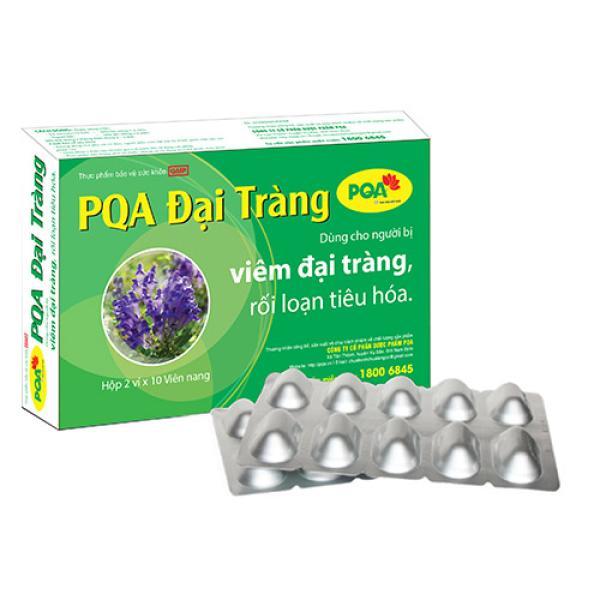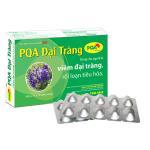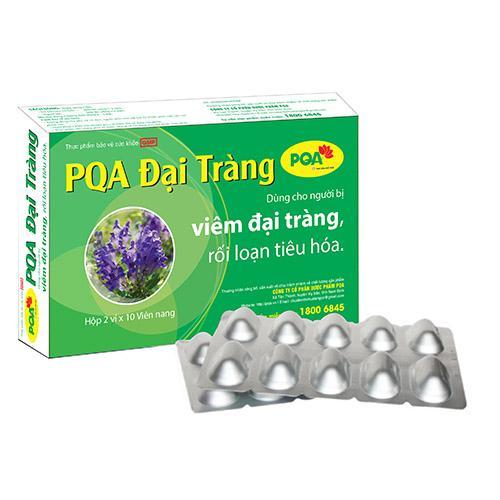MTA ĐẠI TRÀNG INFORMATION
MTA Đại Tràng Capsules are an herbal pharmaceutical product designed for individuals with colitis. They help relieve symptoms of both acute and chronic colitis, as well as digestive disorders.
Ingredients of MTA Đại Tràng
Each 500mg capsule contains 250mg of dry herbal extract equivalent to the following herbs:
- Kudzu root (Cát căn): 1.13g
- Scutellaria (Hoàng cầm): 0.76g
- Coptis (Hoàng liên): 0.76g
- Licorice root (Cam thảo): 0.45g
- Excipients: Sufficient quantity for 1 capsule
Uses of MTA Đại Tràng
- Supports the relief of symptoms related to acute and chronic colitis
- Helps manage digestive disorders
Target Users of MTA Đại Tràng
- Individuals with colitis
- Those experiencing digestive disorders, bloating, irregular bowel movements (alternating constipation and diarrhea), or frequent daily bowel movements
Would you like this translated version formatted into a brochure or product label layout?

Usage Instructions for MTA Đại Tràng Capsules
Take 3 times per day
– Children over 12 years old: 2 capsules per dose
– Adults: 3 capsules per doseEach treatment course lasts 3 months. It is recommended to use 2–3 courses for best results.
Health Warnings
Do not use if you are pregnant or breastfeeding, or if you are allergic to any ingredients in the product.
Consult a healthcare professional before using this product.
This product is not a medicine and does not replace medical treatment.
Storage Instructions
Store at room temperature, not exceeding 30°C, and away from direct sunlight.
Shelf Life: 36 months from the manufacturing date
Manufacturing date: Printed on the product packaging
Advertising Approval Number: 1924/2020/XNQC-ATTP
Product Registration Number: 3449/2020/ĐKSP
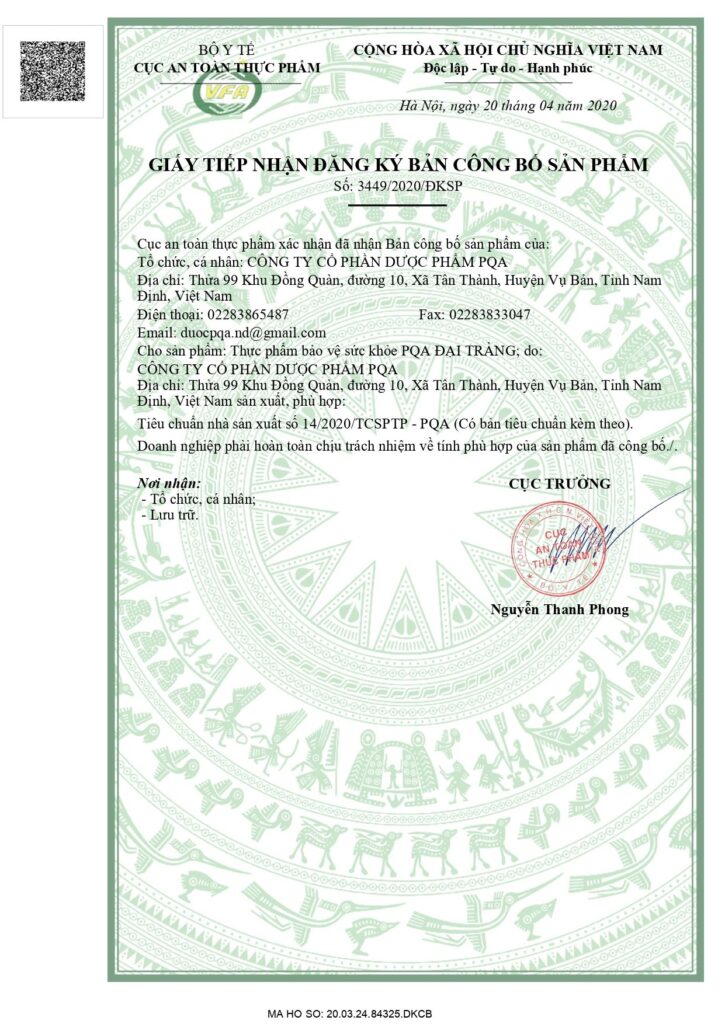
CHRONIC COLITIS
What is Chronic Colitis?
Chronic colitis is the result of recurring acute inflammation episodes in the colon. The disease can be diffuse or localized in the mucosal lining of the large intestine and often leads to ulcer formation in the affected area.
Once colitis progresses to the chronic stage, treatment becomes much more challenging. In mild cases, you may experience colon bleeding, but in more severe cases, ulceration, hemorrhage, or even abdominal abscesses may develop.
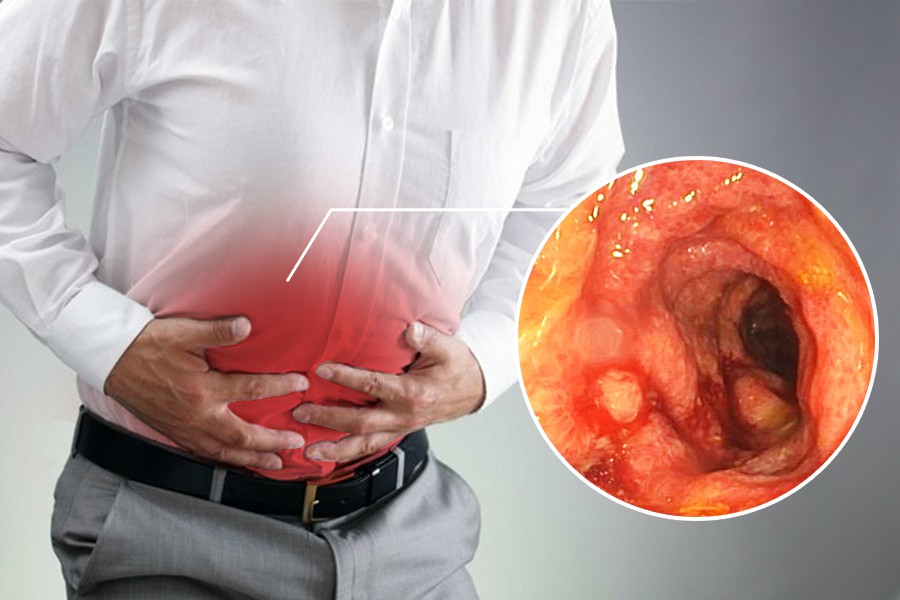
The rate of colitis in our country reaches up to 20% of the population, according to statistics from the Ministry of Health, and this rate is rapidly increasing. Therefore, treating chronic colitis is becoming increasingly important.
What causes chronic colitis?
Chronic colitis can occur due to various reasons. However, it is mostly the result of experiencing other colitis-related illnesses over a prolonged period.
The main reasons that can lead to chronic colitis include:
– Inadequate treatment of acute colitis:
Acute colitis can result from parasitic infections, bacteria, fungi, or toxins. If the acute condition lasts for more than 3 months, it may develop into a chronic form.
– Due to other underlying diseases:
Conditions such as intestinal tuberculosis or Crohn's disease, if left untreated, can cause long-term damage to the colon lining, leading to chronic colitis.
– Unhealthy dietary habits:
Poor food hygiene can introduce harmful bacteria into the digestive system; or irregular, unbalanced eating patterns can disrupt colon function and gradually cause chronic inflammation.
– Overuse of antibiotics:
Excessive use of Western medicine, particularly antibiotics, can erode the colon’s mucosal lining and easily lead to inflammation and ulceration.
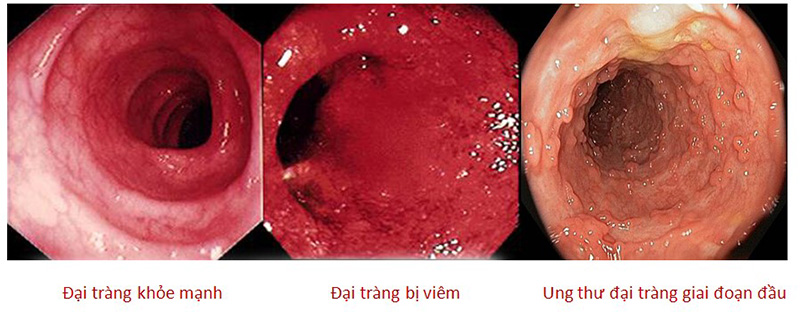
Symptoms of Chronic Colitis
Depending on the cause and severity of the disease, patients may experience different symptoms. However, compared to acute episodes, the symptoms of chronic colitis tend to be more severe and persistent.
Common symptoms include:
– Abdominal pain:
Pain localized in the lower left or lower right abdomen. The pain may be dull or intense.
– Frequent urge to defecate (tenesmus)
– Bowel movement disorders:
Frequent need to defecate, diarrhea or constipation, sometimes both in alternation.
– Abnormal stool:
Mucus in stool, and occasionally, blood.
In addition, you may experience systemic symptoms such as:
Fatigue, loss of appetite, unexplained weight loss, joint pain, insomnia, anemia, pale skin, dizziness… Chronic colitis may even lead to memory decline.
Diagnosis of Chronic Colitis
Similar to standard colitis, chronic colitis is diagnosed by evaluating symptoms. Doctors will also consider your medical history, diet, and lifestyle.
Once a preliminary diagnosis is made, the doctor may conduct a colonoscopy to observe inflammation and the extent of damage. A biopsy may also be performed to help identify the cause and rule out colorectal cancer.
Other diagnostic tests may include:
- Blood tests
- Stool analysis
- Urinalysis
- Abdominal X-ray
- CT scan
These tests are important for an accurate diagnosis and to design a suitable treatment plan.
How is Chronic Colitis Treated?
According to Western Medicine:
Treatment mainly involves medication to alleviate and control symptoms:
- Antibiotics: Used when infection is present, to reduce bacterial spread and control digestive and bowel issues.
- Anti-inflammatory corticosteroids: Used especially in the early treatment stage to reduce inflammation and swelling.
- Anti-parasitic and antifungal medications
- Pain relievers and antispasmodics: To reduce abdominal pain and spasms.

If a cancerous tumor develops or the disease progresses beyond the effectiveness of medication, the patient will be recommended for surgery.
Traditional Eastern Medicine Approach
According to traditional Eastern medicine, chronic colitis falls under the categories of dysentery and abdominal pain disorders. Its causes are typically attributed to four main factors:
- External pathogenic factors (Ngoại tà lục lâm): Infection from external sources.
- Dietary imbalance (Ẩm thực bất điều): Irregular or unhealthy eating habits.
- Emotional distress (Thất tình nội thương): Stress, anxiety, or prolonged emotional strain.
- Spleen and stomach deficiency (Tỳ vị tố hư): Weakened spleen and stomach function leading to long-term illness.
To treat the condition effectively, it's essential to address the root causes while also strengthening the spleen, harmonizing the liver and stomach, and improving digestive health.
The Herbal Formula: Cát Căn Hoàng Cầm Hoàng Liên Thang
This formula helps release the exterior, clear heat, and dry dampness. It includes:
- Pueraria root (Cát căn) as the main herb.
- Scutellaria root (Hoàng cầm) and Coptis root (Hoàng liên) as assisting herbs to clear heat and eliminate dampness.
- Licorice root (Cam thảo) to harmonize the middle burner (digestive organs).
This formula is effective for treating both acute and chronic colitis as well as digestive disorders.
Modern Application: MTA Đại Tràng
Building on the wisdom of this traditional formula, MTA Đại Tràng is a modern herbal supplement developed by MTA Pharmaceutical JSC in a GMP-certified facility. It supports:
- Relief from symptoms of acute and chronic colitis,
- Improvement of digestive disorders, such as bloating, alternating constipation and diarrhea, and frequent bowel movements.
KẾT HỢP ĐẠT ĐƯỢC HIỆU QUẢ CAO NHẤT
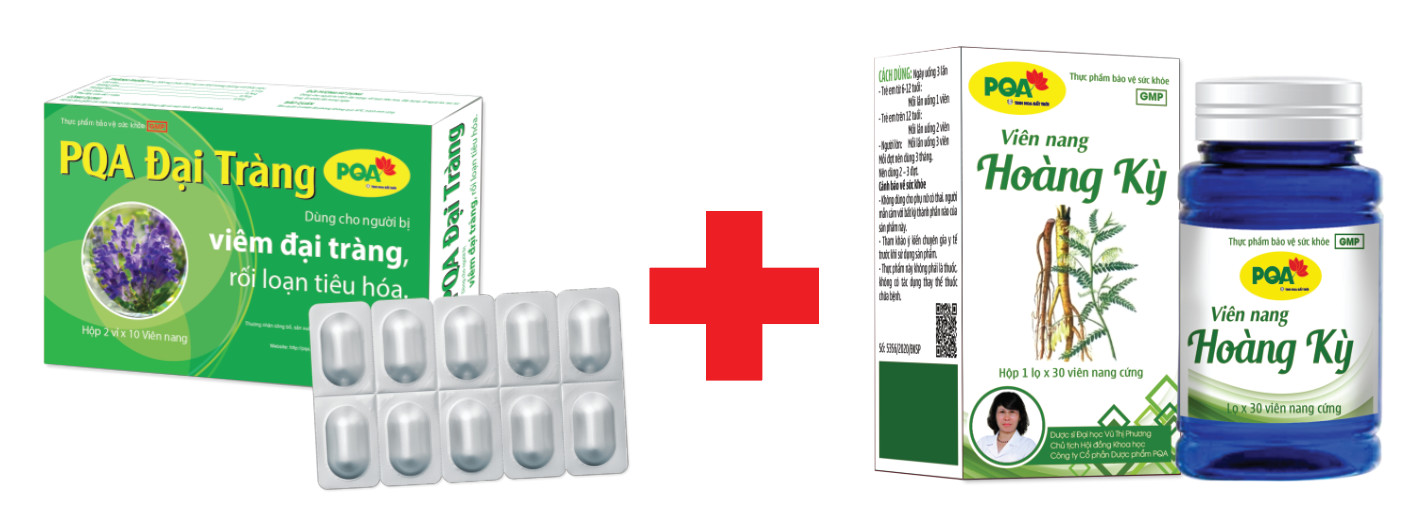
Kết hợp với Hoàng kỳ=> Tăng cường tiêu hóa đẩy lùi rối loạn tiêu hóa, viêm đại tràng
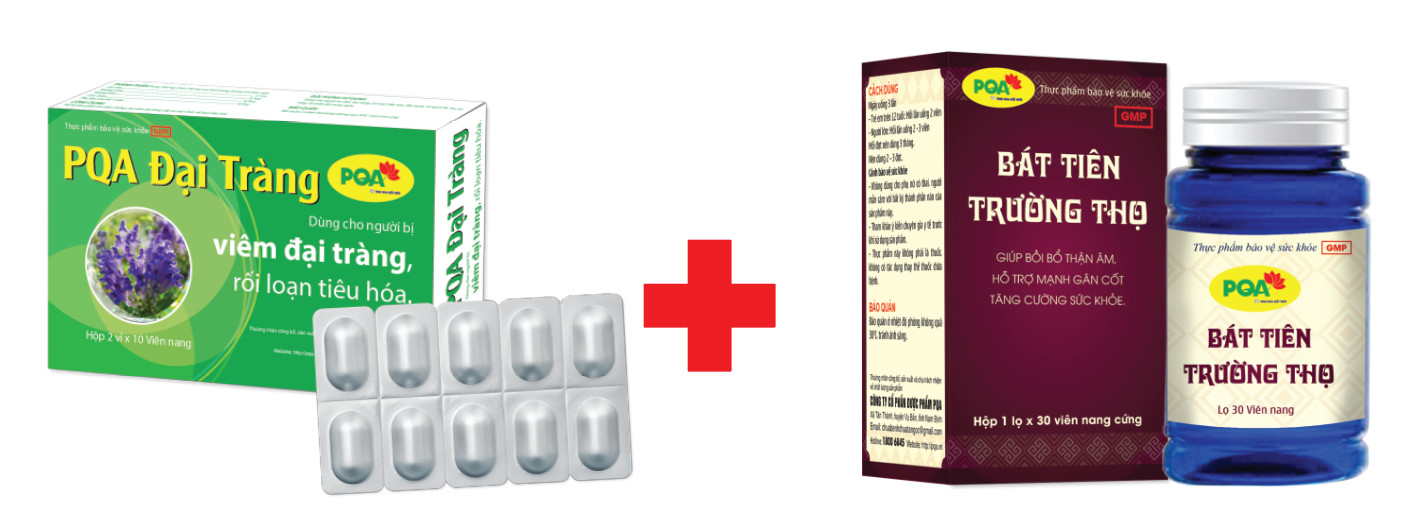
Kết hợp với Bát tiên trường thọ => Cân bằng âm dương đẩy lùi rối loạn tiêu hóa, viêm đại tràng
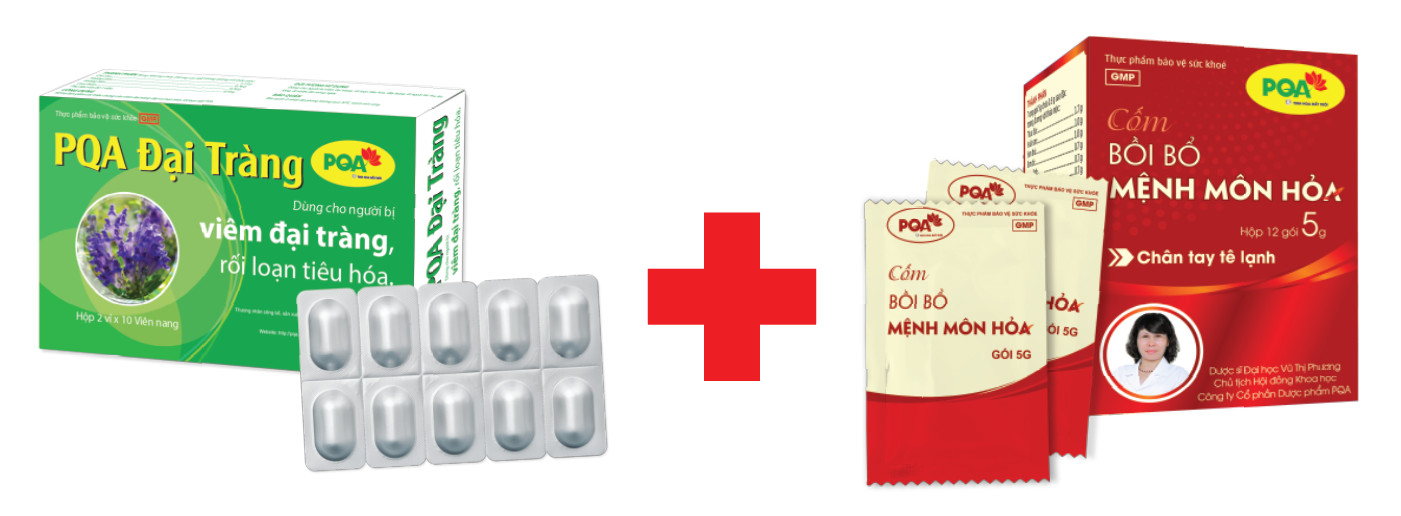
Kết hợp với Mệnh môn hỏa => dùng cho các trường hợp đi ngoài nhiều lần trong 1 ngày
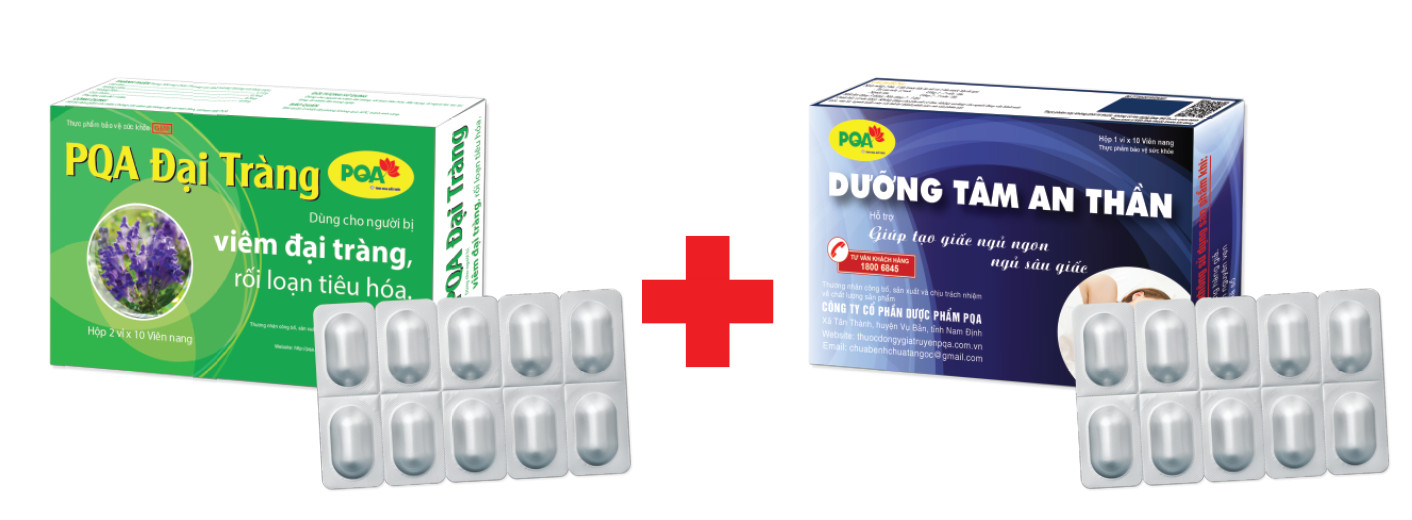
Kết hợp với Dưỡng tâm => Thư can, giải stress giảm co thắt đại tràng
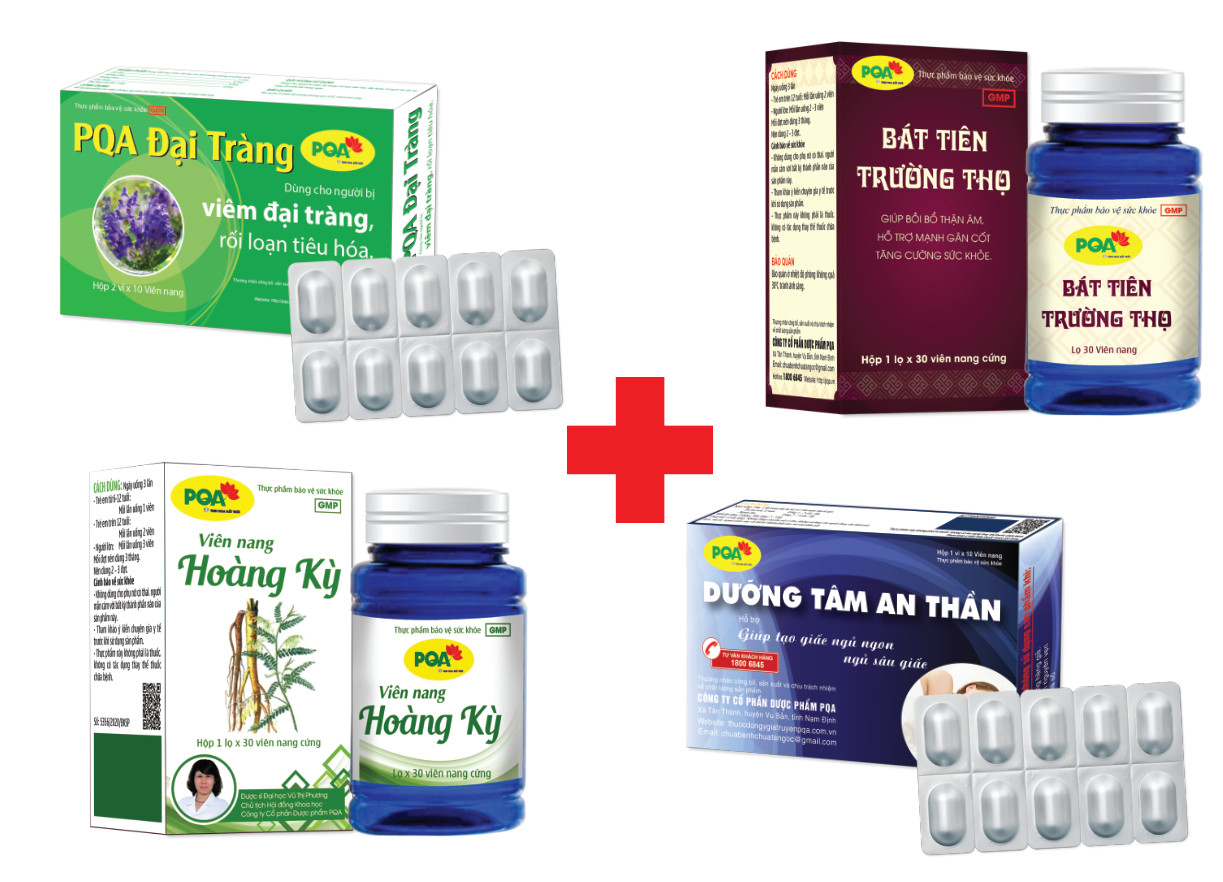
Bộ sản phẩm hoàn hảo dành cho người Viêm Đại tràng mạn tính
PRODUCT USAGE ROADMAP
- Days 10–15: Alleviates pain and rapidly reduces symptoms such as frequent bowel movements, abdominal bloating, gas, and indigestion.
- Days 15–60: Heals the colonic mucosa, repairs damage, and stabilizes colon function.
- Days 60–90: Health is restored, appetite improves, sleep becomes better → Effectively combats chronic colitis.
Principles of Building a Diet for Chronic Colitis Patients
- Ensure adequate nutritional components:
- Protein: 1g/kg/day. Recommended sources: lean meat, lean fish, yogurt, soy milk.
- Calories: 30–35 kcal/kg/day depending on the patient.
- Fat: Limit to no more than 15g/day.
- Ensure sufficient water, minerals, and vitamins.
Recommended Foods
- Rice, potatoes, carrots.
- Lean meat, fish, soy milk, lactose-free milk, yogurt.
- When eating seafood (shrimp, crab, fish, eggs), consume small amounts and eat immediately after cooking.
- Ripe fruits: sapodilla, ripe banana, sweet mango.
- If constipated: Reduce fat, increase fiber intake—especially soluble fiber like pectin and inulin.
- If experiencing diarrhea: Avoid insoluble fiber like cellulose, which may irritate the intestinal lining.
Foods and Drinks to Avoid
- Eggs, lactose-containing milk, fried spring rolls, fatty meats, black beans, raw onions, pickled vegetables, alcohol, coffee, and carbonated drinks—these can cause bloating and gas.
- Avoid high-lactose foods like cow's milk, high-sugar items like honey, and high-sorbitol products (found in some candies), as these sugars are poorly absorbed and may worsen bloating, gas, and diarrhea.
- Avoid hard foods like raw vegetables, corn kernels, bamboo shoots—they may harm intestinal ulcers. Opt for steamed or boiled dishes, and limit stir-fried or saucy dishes.
- Avoid processed foods.
- Do not consume alcohol, coffee, or smoke.
GIỚI THIỆU DƯỢC PHẨM MTA
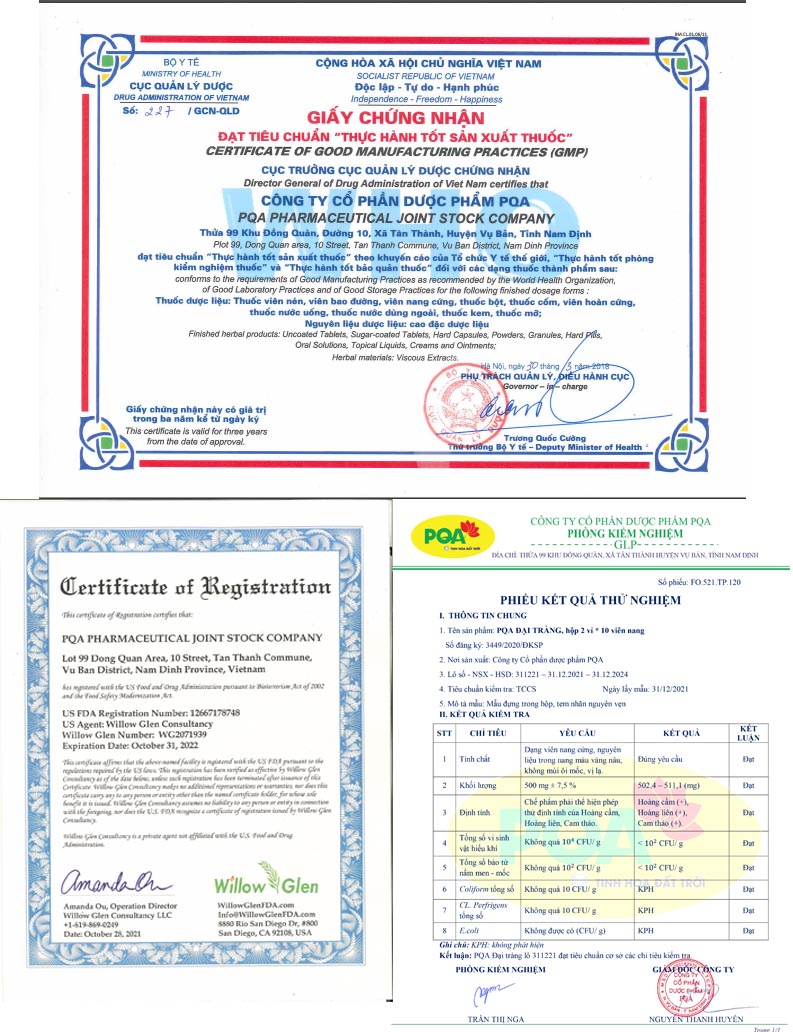
Dược phẩm MTA – Được sản xuất trên quy trình đạt chuẩn GMP
Đã đăng ký với FDA Hoa Kỳ

Nhà máy sản xuất dược phẩm đạt chuẩn GMP của MTA

Khu kiểm nghiệm đat chuẩn GLP của MTA
TRUYỀN THÔNG NÓI VỀ MTA


